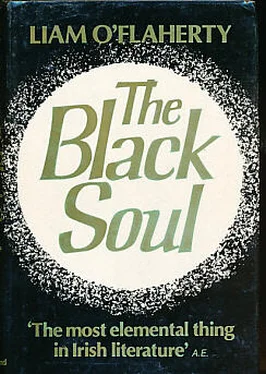He began furiously to denounce everything – religion, Nationalism, civilization.
‘Civilization,’ he said, ‘is only a plaster to hide sores. Priests are hirelings of the patriotic vampires who suck the blood of the people.’
He became eloquent, as Kathleen tried to refute his arguments. In Irish fashion they gesticulated, they struck the table, they said things they didn’t mean to say, and they finally ended by forgetting what they began to discuss and lapsed into a heated silence.
O’Daly, who had stared open-mouthed at them during the argument, then jumped to his feet and laughed.
‘Yah, he said, ‘you two are young and foolish. Sure you know nothing about life. Said the man, “Eat, drink and be merry, for to-morrow we die.” Come on, we’ll go down to Carmody’s.’
‘No, I must go home,’ said the Stranger, also rising. ‘I don’t feel very well.’ He was very pale and weak and he trembled slightly, overwrought by his recent illness and his excitement.
‘Damn my soul,’ cried O’Daly tenderly, catching him by the shoulder, ‘I didn’t know you were seedy. Drink that brandy. There now. Kathleen, ye’re the devil for talk. You … fooh!’ He glared at his daughter.
‘I’m so sorry,’ said Kathleen. ‘Of course I didn’t mean to irritate you. Please forgive me.’
The Stranger took her hand and laughed.
‘Oh, that’s all right,’ he said. ‘I’m quite all right, quite. It’s only nervousness. I’m frightfully sorry.’ But he had seen the softness in Kathleen’s eyes and the blush that suffused her neck as she spoke, and it maddened him still more inwardly. He felt that she was superior to him, had more command over herself, was purer. ‘I must go now,’ he said. ‘No, no, don’t move, Mr. O’Daly. Good night.’
Kathleen began to apologize to him again at the door, but he laughed and bid her good night hurriedly. She watched him going down the path and then called out, ‘Be sure to come again soon.’
‘All right,’ he called, ‘thanks.’ And then, walking hurriedly down the road, he said, ‘Never. Never again. I’m lost. I’m not fit to associate with her. I’m accursed. What a wreck I have made of my life!’
1
Winter died with a melancholy roar of all the elements. For three days storm-driven rain fell furiously on Inverara, while the exhausted sea writhed in the death agony of its winter madness. Then the sun rose in an arc of shimmering light south of the Head of Crom. It shot out its myriad tentacles over the sea and land. It sent out a heatless invigorating light. The sea danced, rippling, and hummed a tune like the sound of insects breathing on a weed-covered rock, as it tossed against the cliffs. Inverara, washed by the rain and torn by the wind, cracked in every pore noiselessly as it began to move. The dew on the crags glittered and then died, sucked into the sun. Each tuft of withered grass that had lain during the long winter between the crevices of the crags, bitten by the frost, shivered. Green sprouts began to crawl up through the withered ones. In the bare green plains above the beach at Coillnamhan the grasses began to wave their pointed heads spasmodically. Like blind men they clawed the air, seeking a way to the sun and warmth. The worms, dizzy after their winter’s sleep, their heads swaying drunkenly on the coil of their bodies, squirmed in the cold light. The birds chirped as they flitted hither and thither trying to find a mate and a nesting-place. The larks rose with the bleak dawn, stammering as they leaped from the earth, as if their music, frozen by winter, was being melted in their throats by the joyous light. Their voices rang out clear and defiant as they soared high over Inverara. The heralds of spring and life, they sounded the reveille to the earth below.
‘Spring has come. Up, you laggards. Your sleep is o’er.’ So whispered the wind, coming in fast, hissing rushes from the sea. It was no gentle, languorous wind. It was sharp and biting. It beat the earth with thin steel rods. It throbbed with energy. It hardened the muscles. It sent the blood rushing from the heart to the limbs. It made the teeth chatter. It aroused passion. It was full of cold lust. It poured into every crevice of the crags, catching everything in its harsh grip. It poured into every cabin to rouse the people. It made the horses neigh and gallop, as it tore the shaggy winter hair from their backs. It was the lashing wind of spring.
The back of the sea was covered with wrinkles as if it were shrinking from the cold caress of the wind. And, spurred by the wind, it struck the cliffs mighty blows gently, like a giant who is building with heavy instruments. It rolled banks of yellow and brown and black seaweed to the beaches to fertilize the earth. Its broad bosom was covered with low ridges, as it heaved itself towards the land, driven by the wind, white thin lines dividing green swathes of water. It hurried, ceaselessly building on the ruins of winter. Its never-ending sound carried all over Inverara, like the panting breath of nature building spring. Every living thing in Inverara breathed its strong smell that was carried on the wind. It loosened stiff limbs and poured iron into blood that had thinned in winter.
Life, life, life, and the labour of strong hands in Inverara in spring. From dawn to dark the people hurried, excitedly opening the earth to sow. At dawn they came from their cabins, their noses shining with frost, slapping their lean hands under their armpits, their blue eyes hungry with energy. They ran through the smoking dew for their horses. From dawn to dark their horses trotted, neighing, their steel shoes ringing on the smooth stones. Through rain and driven sleet the people worked. Cows gave birth to calves, and the crooning of women milking in the evening mingled dreamily with the joyous carolling of the birds. Yellow lambs staggered by their mothers’ sides as they made their first trembling journeys in life. Lean goats were hiding their newborn kids in the crevices among the crags. Everything moved hungrily for life. Even the grey limestone crags seemed to move as the sun sucked the dew from their backs. Smoke rose everywhere, as if nature perspired conceiving life.
The valley that lay beneath Rooruck, bound on the south by the ivy-covered low hill where the crags ended and on the north by the stretch of black, rocky, sandless beach, teemed with sounds of work. Each plot of land, bound by stone fences, was being tilled. Rotted seaweed, whitened by the rain, lay like a healing rash on the yellow grass, spread in winter. Heaps of fresh seaweed, glistening in the sun and sleet, were being dropped here and there from the horses’ backs. Peasants, with their white frieze shirts hanging loose about their bodies, were cutting the earth with spades, covering the potato seeds that the women were spreading. Fierce sounds filled the air, men shouting, horses neighing, spades beating the earth, boys lashing donkeys with seaweed stems, sleet pattering against stone walls.
Spring did not come in a night. It did not emerge from winter like a shell from a cannon mouth. It came gradually. But to the Stranger it appeared to come in a flash, drear and ghastly. For a week after returning from his meeting with O’Daly’s daughter he kept indoors, feverishly disputing with himself, unconscious of everything around him. Sitting silently by the fire, he argued with Kathleen O’Daly, defending his own cynicism against her piety, his own weakness against her fortitude. ‘Bah,’ he would say, ‘she is a fool. Everything is dead. What is the use of virtue or ambition or God? They are all meaningless.’ And yet he could not drive away her memory. Her memory aroused memories of his youth, sweet ambition, respectability, the regard of fellow beings, the solace of religion. She was the emblem of what he had left, of what he had thrust from him. He was conscious that he had gained nothing in exchange. And he clung to that nothing, that annihilation of life, as men cling to a worthless article for which they have paid dearly. ‘She is a hypocrite,’ he would say. He accused her of gross immoralities, but he shuddered at the thought as at a profanation of his mother. He tried to arouse obscene desires in his mind for her in order to break the spell of her personality, but in vain. He could not think of her as a woman in the flesh. She was almost a spirit. She was the personification of memories. And in revolt against this spell he lounged slothfully about the cabin, unshaved, unwashed, scowling, in order to drive himself farther down into the abyss of degradation where even memories of cleanliness could not reach him.
Читать дальше












